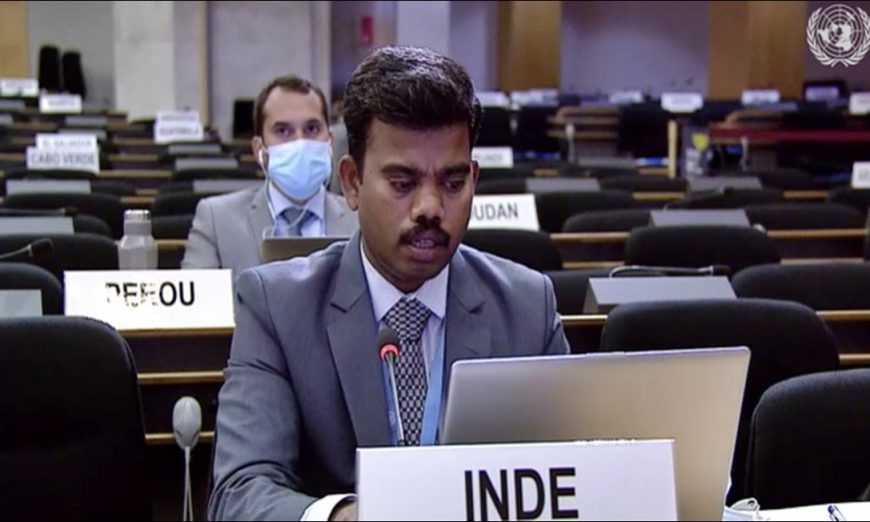Calling Pakistan a “nursery and epicenter of Terrorism”, India while exercising the right of reply at the ongoing 45th Human Rights Council Meeting in Geneva, said that the world doesn’t need lessons on human rights from a country which has been known as “nursery and epicenter of Terrorism.”
India’s Third secretary at its mission in Geneva, Senthil Kumar while making the statement also said that in the Pakistan Occupied Jammu and Kashmir, Pakistan has effected “demographic change by reducing and driving the real Kashmiris out.”
Referring to the disappearances and forced detentions of democratic voices in Pakistan Occupied Kashmir, India said, “Cases of enforced disappearances, murders, detentions, custodial deaths and torture of civil rights activists, representatives of local political parties and journalists are common and standard practice adopted to silence voices against the Government and deep state in Gilgit-Baltistan.”
Pakistan government has also been accused of rampant media censorship and blocking channels of expression of popular resentment to ensures that the correct ground realities are never reported.
Subjugation of Minorities in Pakistan is a well documented case. Expressing concern on the near annihilation of religious minorities in Pakistan, the Indian representative remarked that the population of religious minorities in Pakistan which was 23% in 1947 has now reduced to an insignificant number.
The Indian statement attributed the declining population of minorities in Pakistan to “Systemic discrimination and persecution through killings, violence, forced conversions and forced displacement”.
Referring to the terrible situation of ethnic and religious minorities in Pakistan, Indian statement said “Pakistan’s deplorable human rights records and discriminatory treatment of its minorities has been a cause of persistent concern for international community.
In Pakistan, Blasphemy laws are being used against religious minorities such as Christians, Hindus and Sikhs, to violate their human rights and dignity”.
There are currently at least 80 people in prison in Pakistan for the crime of “blasphemy”, with at least half of them facing life sentences or the death penalty. At least 42 cases pertaining to blasphemy were registered across Pakistan in a single month.
The statement also highlighted the poor human rights condition especially in regions of Pakistan where ethnic population is facing the atrocities in the hands of government authorities “Enforced disappearances, state violence and forced mass displacements, harassment, extrajudicial killings, army operations, torture, kill-and-dumps, torture camps, detention centers, military camps are regular features in Baluchistan.
Nobody knows the fate of missing 47,000 Baloch and 35,000 Pashtuns till date. Sectarian violence has claimed more than 500 Hazaras in Baluchistan and more than 100,000 Hazaras have fled Pakistan,” said the statement.
Denouncing Pakistan’s propaganda at the world forum, India said that before preaching to others Pakistan must remember that terrorism is the worst form of human rights abuse and crime against humanity.
Referring to the disappearance of Baloch Rights activist of Rashid Hussain in December 2018, and the killing of journalist Sajid Hussain Baloch after he went missing in March 2020, India said “The case of the disappearance, only serves to demonstrate that the Baloch human rights defenders are being targeted and eliminated even after they quit Pakistan.”
There has been reports where Pakistani state machinery as been exposed in perpetuating crime against Balochs. A recent report states that in Baluchistan, armed men move freely on the streets, despite the heavy presence of the security forces.
These armed men are free to kill, abduct and steal with impunity. Recently a group of three such gunmen were caught in a house in Kech, where they killed a lady and injured a baby girl.
Gunmen captured by the family, had identity cards of military intelligence and confessed that they work for country’s military. People of different walks of life took on to the streets and demanded dismantlement of so-called death squads. Protests continued for months with no result.

